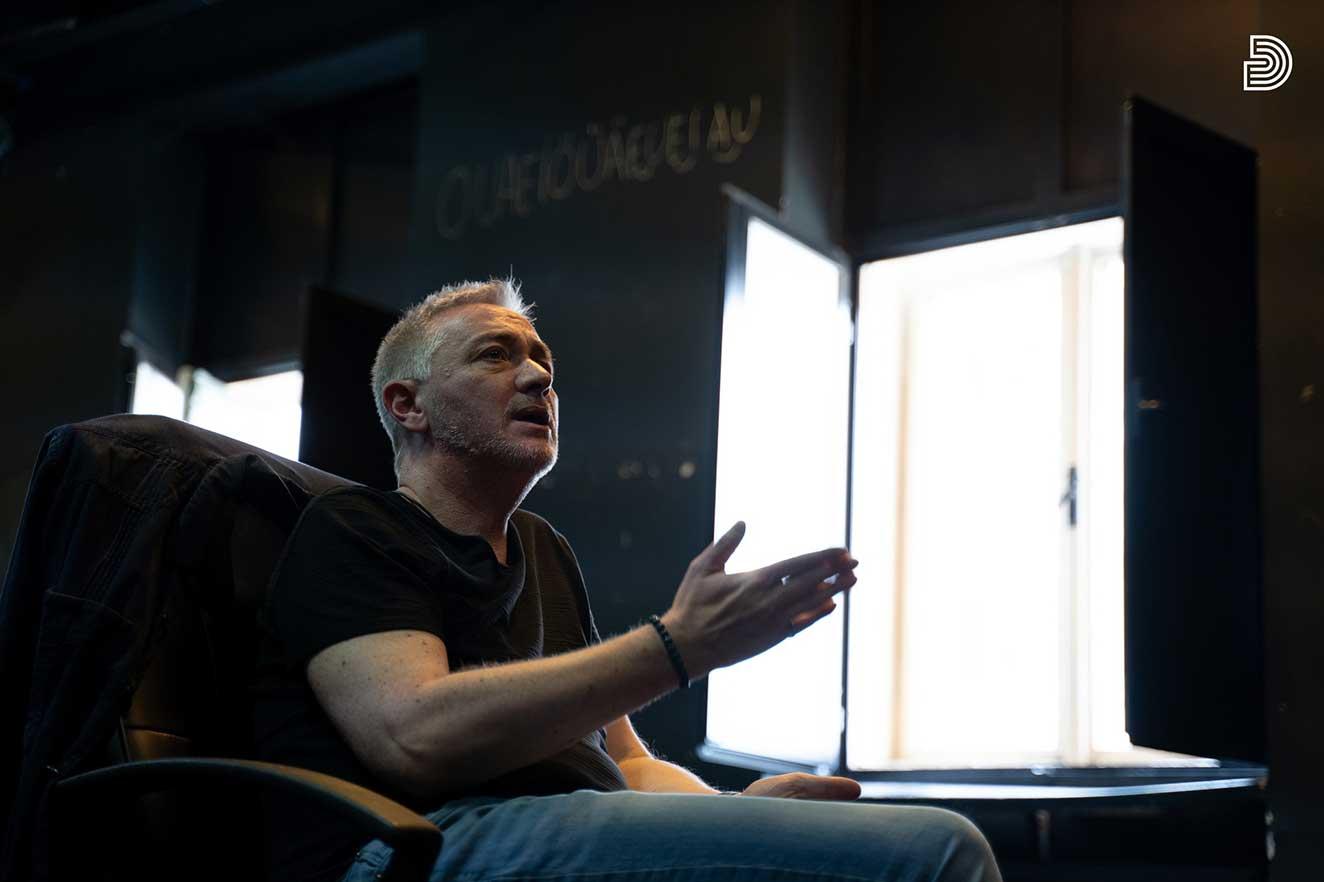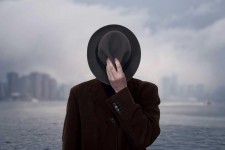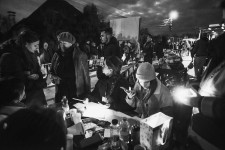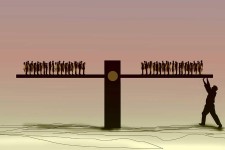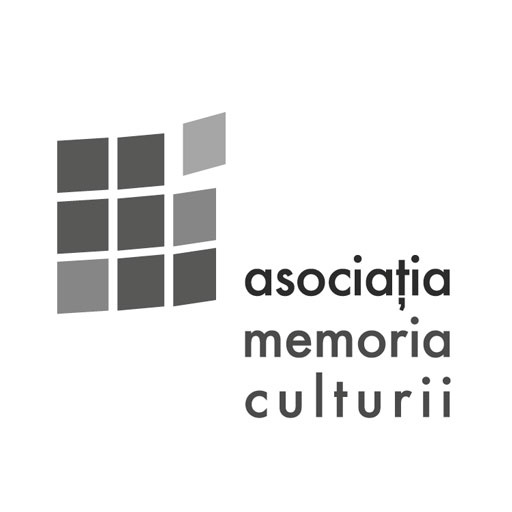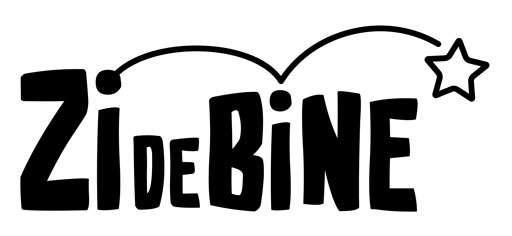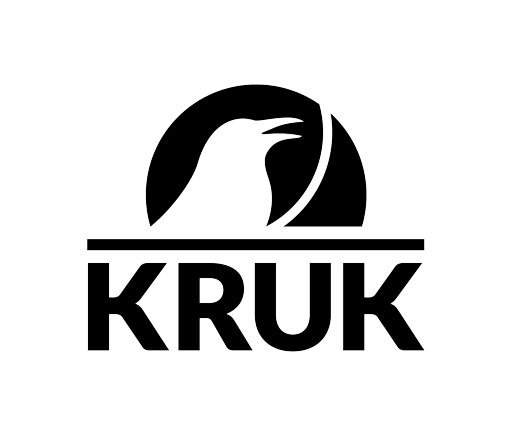Yuri Kordonsky was born in 1966 in Odessa, then part of the Soviet Union, where he lived until he was 23. He studied computer science and in the late 1980s moved to St Petersburg, where he graduated with a degree in directing and acting from the State Academy of Theatre Arts. Since 2001 he has lived in the United States and teaches directing at Yale University.
Yuri Kordonsky, Yura as he is known to his friends, is one of the most respected theatre directors in Europe. Some of his internationally selected and award-winning plays have been staged in Romania. He has been awarded three UNITER prizes, most recently in 2018 for directing the performance The Incredible and Sad Tale of Innocent Eréndira and her Heartless Grandmother, text by Gabriel García Márquez, a production of the German State Theatre Timișoara (GSTT).
This year he returned to GSTT, where he staged a new text, Evhgeni Schwarz's The Dragon, motivated by the war in Ukraine. The performance, banned by Stalin in the Soviet Union, is an artistic investigation of how fascist dictatorships are established and endure, and about the compromise that ordinary people make with destructive ideologies.
We talked about identities, Russian literature and culture, propaganda, theatre as a manifesto, the consequences of the war in Ukraine, and how this conflict will end sooner or later.
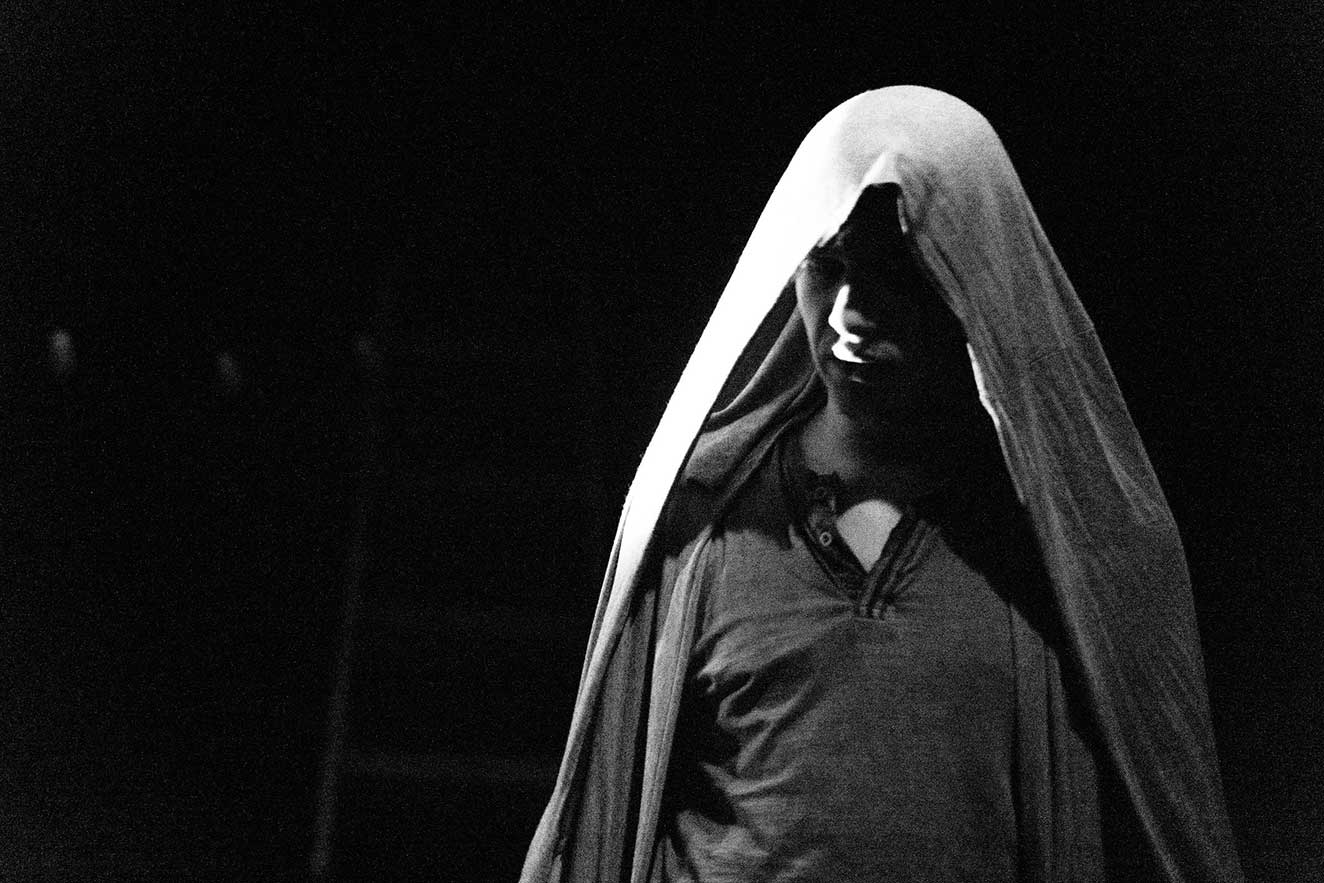
You are a Ukrainian of Jewish descent born in Odessa, and you lived there your entire childhood. Until you left, what was the atmosphere in the Ukrainian and the Russian communities?
Well, it was a long time ago. Indeed, I was born in Odessa and I lived there until I turned 23. Odessa, as you probably know, is a very cosmopolitan city, it has always been like that. I wouldn’t venture into trying to articulate what Odessa’s identity is. I can definitely say that it’s not just Russian and not only Jewish. In a way, Odessa’s identity is a mix of ethnicities, nationalities, languages, histories, and so on. I was born to Jewish parents and my ancestry goes back to a very small Jewish settlement in the western part of Ukraine. People may be a little bit familiar with those places from the famous musical Fiddler on the Roof. My grand-grand-parents spoke Yiddish; though my parents did not know it. I don’t speak any form of Hebrew, but my background is Jewish. I am Jewish. At the same time, my close relatives were never religious, never practised Judaism, they were all born and grew up in the Soviet Union, and their religion was suppressed in general, so my family is a secular one. My parents moved to Odessa, which is a huge city, with more than one million people, and their sense of Jewishness was watered down. It doesn’t mean that I forgot my roots or that we, my family and my relatives, forgot all the atrocities Jews went through, starting from the 19th century, in tsarist Russia, or the pogroms of the 20th century.
Unfortunately, at the hands of the Romanians as well.
At the hands of Romanians and at the hands of Russians, and at the hands of Ukrainians, and so on. Being a Jew in Russia and Ukraine has never been easy. Part of my family vanished in the ghetto and at Babi Yar, a famous place of mass executions of Jews near Kyiv. Most of the Jewish population, especially in big cities like Odessa, Kyiv, or Kharkiv, spoke Russian. Meaning I was born in a Russian-speaking family. My mother was a librarian so I spent hours and days and weeks in a library. We couldn’t afford a babysitter so she had to take me to work and that’s where I spent my childhood, reading every book that I could get a hold of. Most of them were in Russian, so I grew up with Russian books, Russian cartoons, Russian movies, Russian music, and Russian theatre. I went to a Russian school, and I studied science in Russian. If you ask me some mathematical or physics terms in Ukrainian, I wouldn’t know. Essentially the culture that I absorbed was the Russian one: Tolstoy, Pushkin and Dostoyevsky, Chekhov, and Bulgakov.
I must say, when I was growing up in Odessa, the Ukrainian language was spoken by a minority of people. There were several theatres, quite good, and only one of them was a Ukrainian theatre. Because of that and because of the cosmopolitan nature of Odessa, they struggled to bring the audience. There were some Ukrainian schools, but you had to go the extra mile to take your child there, you had to commute long distances. In most of the schools, the curriculum was in Russian.
So how did the majority of Ukrainians identify themselves? Were they forced by circumstances to become Soviet, or Russian?
It is hard to say for sure, I don’t want to speculate because I was not part of the Ukrainian community per se. I know that people from western and central Ukraine spoke Ukrainian and their children were growing up as Ukrainians, but it was hard for them to keep their identity, most felt antagonised for trying to keep to their language. Most people identified themselves as Soviets or colloquially, if somebody asked you what you were, you would sometimes say „I am Russian”, not because you were ethnically Russian but because, in a way, you were born in Russia, because you spoke Russian. For years, I have said that I am from Russia, which is actually not true. What I meant was that I was from the Soviet Union, but you see, USSR and Russia were interchangeable terms.
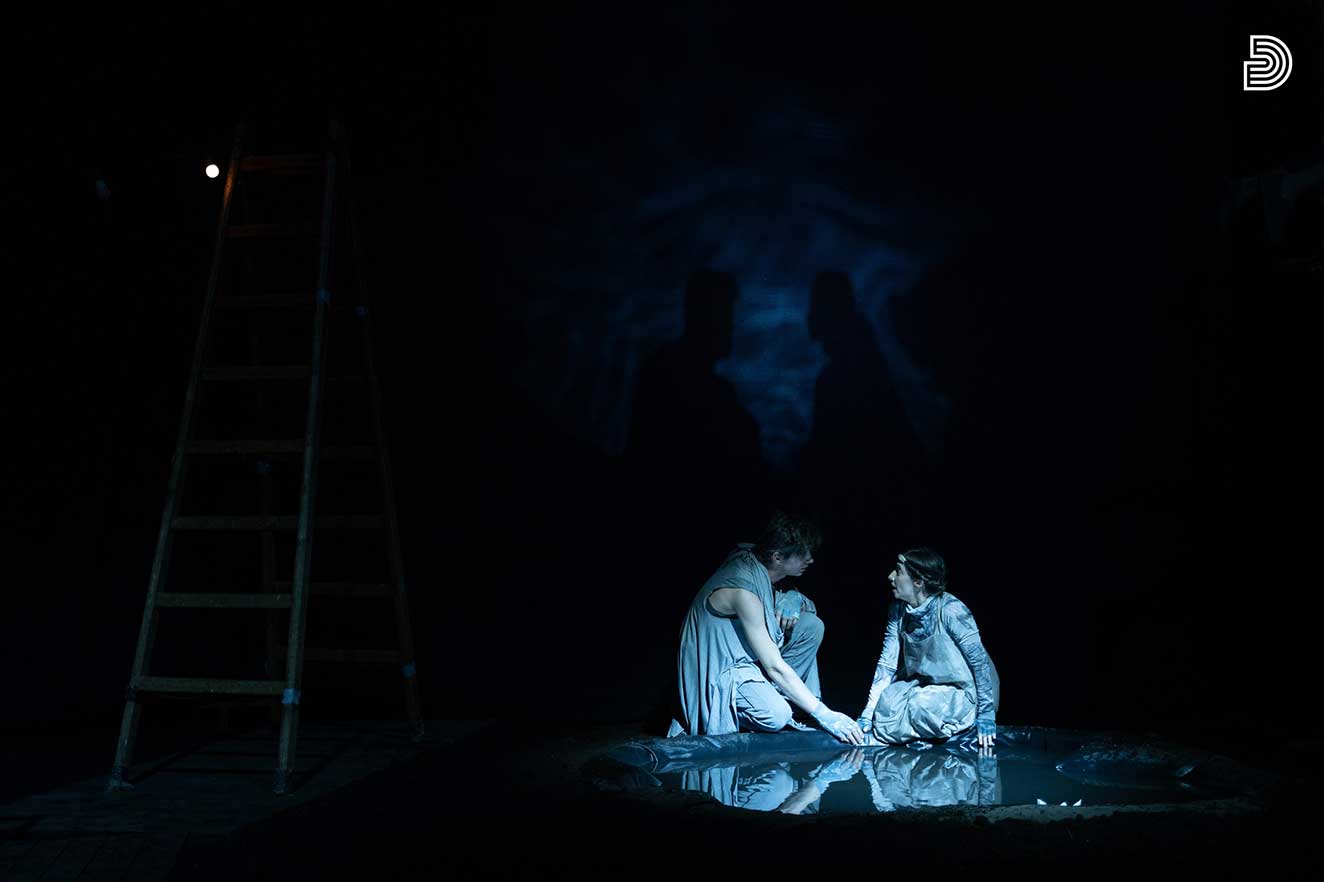
What is your relationship with Russian culture? It is part of your upbringing, Dostoevsky, Pushkin, and Chekhov, but now it is also the culture of an invading nation that’s trying to annex another country. Did anything change?
This is a very painful topic for me. As a child, growing up part of a certain culture, you cannot and don’t know how to be critical about it. I read Crime and Punishment for the first time when I was 13, and I read it in two days. I remember my parents were changing the wallpaper and I was bored so they gave me this book and I couldn’t stop. Obviously, at 13 you can’t understand most of the nuances and the messages, you can’t discern what is great literature and what is imperialist propaganda. You just don’t have the tools and the knowledge and enough context to take things critically as they come to you.
The problem of my generation is that we absorbed everything that came along with Russian culture - chauvinism, imperialist ideology, things that were sometimes obvious, but in many cases, like Pushkin, or Dostoevsky, they were wrapped in so much talent that you couldn’t see the poison that was coming at you from those pages. There were a lot of anti-Semite messages, but somehow we learned how to rationalise it, to internalise it, to think that maybe something is wrong with us, not with the world. Any culture is greater than any one person, and those who know this can push people and children into submission.
My heart is fully on the part of Ukraine. I left Ukraine many years ago and then I spent 12 years in Russia, a lot of my friends are in Russia, from Sankt-Petersburg, from Moscow, but my heart is broken every day by what Russia is doing, using culture for propaganda, forcing xenophobia and fascism as the norm. I feel a sense of incredible injustice and tragedy that Russia, which I used to think was my country, is now doing to my other country. I’m going through an identity crisis as I am trying to understand, as a Jewish kid born in Odessa, Ukraine, growing up with Russian culture, why is this happening, why is Russia killing people, killing my former neighbours, bombing the cities. My parents have a friend, a Russian woman, she is 90 years old, and she doesn’t want to leave Ukraine because she considers it to be her home. Every day she wonders why her country does that to her, why is it bombing her house.
Do you think that Russian culture, arts, literature, music, and movies, influenced Russian politics today? How do you think it influenced the Russian people? Does it fuel them? Their sense of superiority?
There are parts of Russian culture that are very imperialistic. Chekhov is probably one of the very few non-imperialist Russian writers. What’s tragic is that the Russian politicians today and Russian propaganda are using Russian culture to fuel this sense of superiority, essentially stoking up a fascist mentality – “the Russian race is above others, so is the nation, Russians are better, Russia is bigger; just look at the arts, the writers, the musicians, look at Tchaikovsky!”, etc.
Tragically, there are two huge problems. First of all, people who actually do that, who listen to those messages, didn’t read Tolstoy for instance, and if they did, they didn’t understand anything. Tolstoy is one of the most anti-imperialist writers in the world and the propaganda is using his name. If you actually read him and you understand his texts, the disinformation collapses. It’s the name on the cover of the books that they’re using but not what’s inside these books.
The other problem is that they dirty everything with their touch. It is a combination of real, deep ignorance with which they dirty the culture. Most of the artists they are using today for propaganda were persecuted, killed in the Gulag, died in fabricated car accidents, starved to death, and forced to emigrate. Nobody did more damage to Russia than the Russian government.
So Russian politics is hypocritical. It tries to silence anyone who thinks and acts differently.
Anyone talented.
But if they become important, part of the universal heritage, they will inadvertently get used in the service of propaganda.
They will be killed and afterwards, their name will be used by the propaganda without a moment of embarrassment.
If this is the case, do you think it’s fair that people from the other side of this conflict, mostly Europeans, reject Russian culture today?
I can say that at times I thought the same. I’ve been extremely angry. I teach at the Yale School of Drama, and one of my classes is a directing seminar. It’s me and three students and we mainly work on realistic plays. We learn how to analyse the play, how to read the script, how to understand the dramatic conflict, and the dramatic core of the play. And typically I’ve been using Chekhov, as his plays are the best materials for this kind of work. And last year I cancelled him, I personally participated in cancelling Russian culture. Because I could not, in clear conscience, teach Chekhov. After a while, I reconsidered, of course, but I think it’s only a natural reaction of any human being in their right mind, to reject everything that comes from Russia.
It’s not even a question of fairness or unfairness. Yes, you can reject Dostoevsky and Brodsky, but they are on the opposite side of the spectrum in a way. Meanwhile, the atrocities Russia is committing in Ukraine are too big for nuance, and there is no time for nuance, I think. Who has the patience today to say this poem by Pushkin was anti-tsar and anti-war, but in another poem, the same Pushkin was pro-tsar and pro-war. Read this poem, but not that poem... I don’t blame anyone for the anger they experience towards Russian culture and everything that comes from Russia. The time will come when we will have to separate the healthy from the sick, dirt from gems, but only when people stop dying in Ukraine. Right now people are killed every day. I don’t blame people for being angry and potentially dangerously painting the entire Russian culture as hostile. It is an exaggeration, but an exaggeration during the time of war.
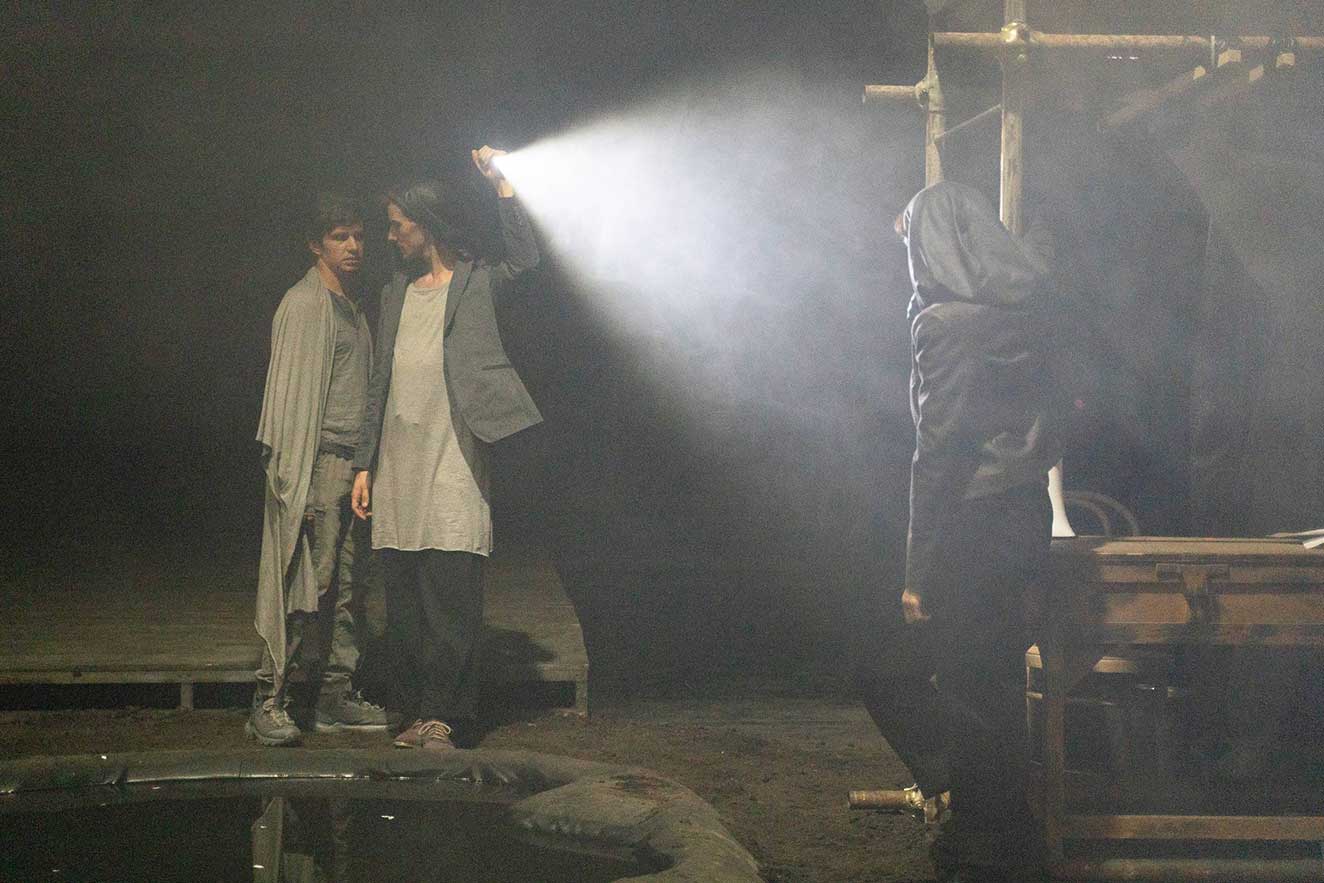
Obviously, you still have dissidents like Solzhenitsyn, you have people who spoke out against dictatorships, and writers like Shalamov, Zamyatin, Grossman, and Schwartz. Tell me about The Dragon, a play that you staged this summer at The German State Theater Timișoara. Why pick this play now? Why not in 2014?
I’ve been living in the United States since 2001 and I was absolutely furious in 2014 when Russia annexed Crimea and started violence in Donbas. Sadly, I cannot say I was surprised. One of the reasons we left Russia was Putin’s ascension to power. Suddenly residential buildings started exploding, and hundreds of people died in Moscow, in Volgograd, obviously a pretext for restarting the Chechen war. Then there was the Kursk submarine disaster and Beslan, and I had no illusions anymore about who Putin was. I remember my wife and I talking about him during a press conference he had, and we knew exactly what was going to happen and what Russia will become in 20 years. A lot of my friends, very smart people, were somehow deceived by him, by the first 10 years of his regime. Some of them told me that he changed, he wasn’t like this in his early years, but this isn’t the case. He wasn’t different back then, he had a street gang mentality, you have to kill first, or you get killed. In 2014, I remember thinking that now he finally dared to do what he always wanted, it wasn’t a new Putin, it was the same guy, he just didn’t have the courage until then.
As for the Dragon, I’ve been thinking about staging this play for many years, even before I left Russia, because the play is about the origins of fascism and not about the fascism of one particular leader.
Dictators have mental deviations, they are violent and crazy people, but this comes as no surprise to anyone. The surprise is how a huge country absorbs propaganda and becomes proud of the fascist ideology. This happened with Nazi Germany in 1930, it happened with Stalin’s Russia until the 1950s, it happens today with Putin’s Russia. This play has always been attractive to me because it explores the scariest part of fascism, not its leaders, but how ideology and propaganda are embraced by regular people.
So The Dragon is not about one single dragon, actually. The dragon can be anyone and everyone.
Absolutely, and Evgeny Schwarz, the author of the play, states that clearly. The dragon, sorry for the spoilers, dies quite early on, but what happens afterward is the scariest part.
Why do you think people accept the dragon? Sure, if the dragon comes with a hundred other dragons… Communism in Romania was forced by the Russian army, you couldn’t do anything about it back then, but it took us almost 50 years to rebel against the system. People made a compromise. Why do you think Germans accepted Hitler? Why do you think Russians accept Putin?
I am still puzzled by these questions. It is really scary to go out on the street, in Russia, with an anti-war sign. You need to be a hero to do that. There are some Russians who are in jail today. Not all Russians are on the side of Putin, but only a very small number have the courage and guts to be open about it. Most people don’t want to go to jail, they may know the truth, but they will never speak it outside of a whispered conversation in the kitchen. Most people are not heroes. Fear plays a huge part. It must be pleasing to some, I can imagine, to feel they are part of a “superior race”. One of the most disgusting tools used today by Russian propaganda is the dehumanisation of Ukrainians, they are considered subhuman, just like Jews were.
We can also talk about ignorance, about the ignorance of conscience, the choice to not seek the truth, and I’m sorry to say that society is intentionally atomized. Any sense of empathy is intentionally removed. We know that famous saying: “First they came for the socialists, and I did not speak out—because I was not a socialist. Then they came for the trade unionists, and I did not speak out—because I was not a trade unionist. Then they came for the Jews, and I did not speak out—because I was not a Jew. Then they came for me—and there was no one left to speak for me.”
If someone lives in Vladivostok they don’t really care what happens in Kyiv. They don’t even care what happens two streets away. And this mentality is part of any kind of fascist regime, locking people inside their tiny, tiny shelves – this is my family, this is my wife, my husband, my child, and beyond that, I don’t care about anything else. Fascist regimes work to destroy any sense of community, and by that they make you think you can’t actually change anything. Social pessimism.
People don’t vote. Which I also know is a challenge in Romania and Western democracies. A lot of people say: “My vote means nothing, there are big political games at play”. And that’s exactly what they want. I’ve been rereading Joseph Goebbels’s books just to see how propaganda works and it was relevant back then and it’s relevant today. He spoke about the fundamental rules of destroying society. He was very smart and very dangerous and they learned a lot from him.
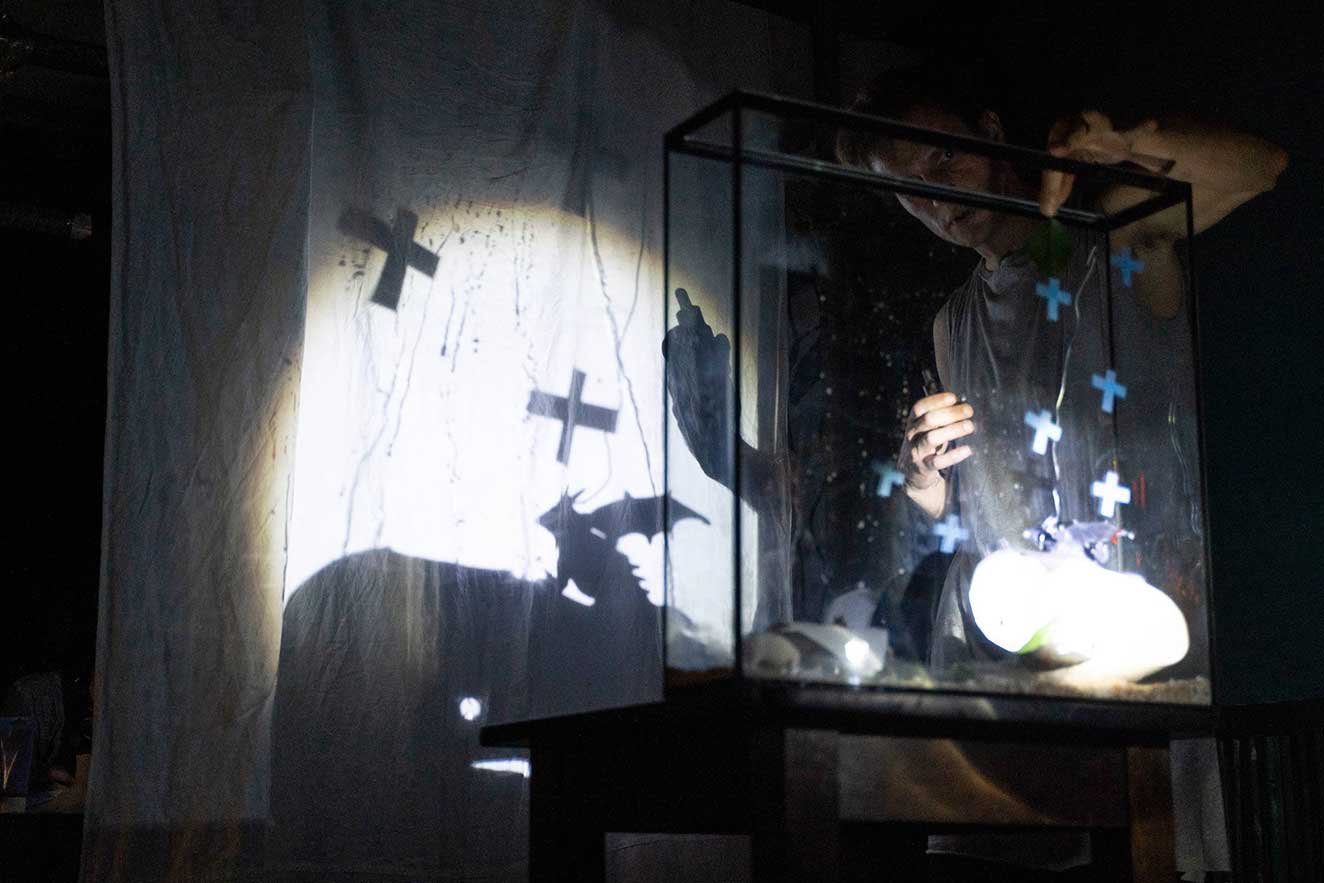
Milan Kundera once said that a small nation is a nation that could disappear overnight. It can vanish at any time, caught between expanding ideologies - Nazism, Communism, Fascism. Is staging The Dragon your revenge, a fight against these harmful ideologies? Your weapon?
Somebody said: “Art is not a doctor. Art is pain”. In other words, I don’t think theatre is a tool for improving the world. I’m not optimistic enough. I don’t think that if we do this performance, ten other performances, a thousand performances, people will stop killing each other. I’m pessimistic. I think what we do is diagnose people, and give them feedback - this is where it hurts and it should hurt. And if it hurts there that means something is wrong here. I don’t know if we have solutions, I don’t know if we have such a direct impact on what happens in the world. It’s more like screaming at the top of your lungs: “Something is wrong, people! Let’s do something about it! “
Last year we staged a performance at the Bulandra Theatre in Bucharest called The Zinc Boys by Svetlana Alexievich, who is a dissident from Belarus, and a writer, who was also persecuted and imprisoned. It was the time when the war had just started, 3, 4 months. It was the summer of 2022 and I remember an atrocious feeling of helplessness. I came to the Bulandra for this play and I felt useless - ok, one more show, and then another show, how does that change the world? The world is still a crazy place. I felt this absolute lack of motivation to continue theatre until I came across this book. I had read it before, but my wife reminded me of it. If there is any literature today that I can adapt into a play, it would be this book. Nothing else literally matters anymore. And, interestingly, it's a documentary book, it’s not fiction. I feel like I'm really becoming more and more fascinated, obsessed with the question “What makes people fascists?” Again, I don't mean leaders, I mean ordinary people. What makes them fascists? What makes that Russian mother, somewhere in Siberia, pack up her son, and give him a sweater, and a warm jacket, knowing that he is going to kill Ukrainians? She gives him warm socks…, what makes people do that?
The Dragon is basically an exact continuation of The Zinc Boys. This time it's fiction, written by a Soviet writer in 1943, when Russia, the Soviet Union, was in one of the most dangerous wars to ever take place. At that time, it was still not really clear that Hitler was going to lose. So, on the one hand, the dragon was attacking Schwarz’s country, and on the other hand, another dragon was leading the country – Stalin, who banned performances of this play. Schwarz died a year later. But I think there is a very loud cry of desperation in his text: “People, you are dragons!” It's easy to blame Hitler and Stalin, but they couldn't have done what they did if it weren't for millions and millions of people taking up arms and killing.
What do you think can save Russia from herself? What can save Russia from the dragon and the dragon inside of every Russian?
Just like Nazi Germany, Russia needs to go through a humiliating defeat and forceful denazification of the country. I think that’s the only hope for it – similar to what Raskolnikov does at the end of Crime and Punishment: he went to the public square, in the middle of the town, got down on his knees, and said out loud so anyone could hear him: “I am a murderer!” It’s the only way Russians will be able to shake off their imperialistic culture. It’s just that I don’t see it happening anytime soon.
So how do you think this war will end?
This is an existential war for Ukraine. Nations don’t lose existential wars. It’s not an existential war for Russia. They will lose. The question is how many more lives will it take, how many years before Russians become exhausted, and come to the point where they are unable to finance this war? Ideally, Ukrainians will be able to push them back to the borders of 1991 which were established when Ukraine declared their independence. Even after that, Russia will remain a very dangerous neighbour, because things won’t fundamentally change. I think what we will see after a while is some kind of temporary break, a temporary peace until Russia changes its own DNA through some historical process. But this will not happen in our lifetime, I don’t see the end of the war as an ultimate and crushing defeat, just an endless continuing conflict.








